LA SAPIENZA UNIVERSITY OF ROME – MEMOTEF DEPARTMENT, IN COLLABORATION WITH RAW-NEW, PROMOTES THE “COLLABORATORIUM FOR SOCIO-ENVIRONMENTAL ANALYSIS OF THE OCEAN”. THE INNOVATIVE PILOT RESEARCH WILL FOCUS ON THE COASTAL WATERS OF ANZIO (ROME), STARTING FROM FEBRUARY 2025
The link between human society and the ocean is deep and vital, but at the same time threatened by dynamics that risk compromising the balance of the entire marine ecosystem. Coastal waters, in particular, represent one of the points of greatest interaction and conflict between anthropic activities and the natural environment, highlighting critical socio-environmental issues that require urgent interventions.
From February 2025 the “Collaboratorium for Socio-Environmental Analysis of the Ocean”an innovative project promoted by Sapienza University of Rome – Memotef Departmentin collaboration with the independent British video documentation company Raw-News.
The Collaboratorium aims to develop a dedicated, reproducible and scalable methodology to analyze the relationship between society and the ocean, focusing on the main socio-environmental issues affecting coastal waters.
The pilot trial will focus on the coastal waters of Anzio (Rome, Italy) and will last eleven months, from February to December 2025. The project will involve local institutions and communities, including administrations, maritime professionals, environmental, cultural and social associations, schools, industrial partners, shops and tourist services, as well as national and international experts in social and environmental sciences.

Exploring the link between society and the sea
The Sapienza research team will document the main environmental emergencies, such as theplastic pollution in the Gulf of Anzio, using interviews with key actors, field analyses, socio-geographical elaborations and video-photographic reportages, both in the open sea and underwater. The objective is to explore the link between society and the sea to address environmental issues and reinterpret the sense of common belonging to the ocean.
The research will analyze how coastal communities perceive and experience the changing oceans invaded by plastic pollution. A problem that contaminates water, harms marine wildlife and compromises human health through the food chain. The microplasticsin particular, accumulate in the tissues of marine organisms and reach dinner tables, raising serious public health concerns.
The project is led by Chiara Certomà of Sapienza University of Rome – Memotef Department, with the support of research fellows Caterina Pozzobon and Luca Bertocci, and in partnership with Federico Fornaro, director of Raw-News and the water photographer Giuseppe Lupinacci.
Activities include collaborations with an international network of scholars, activists and institutions, such as U.N. Ocean Decade Action, Marine Social Science Network, SAP&O Science+Art+Participation in&about the Ocean, Bremen Ocean World From Outside Inthe European project PartArt4OW and the project TidalArts.
Strengthen the emotional bond between society and the sea
The CO>SEA project, promoted by the Collaboratorium, addresses global ocean challenges, including rising temperatures, tropicalization, acidification, oxygen loss and multiple forms of pollution. This approach is not limited to documenting ongoing changes, but proposes technical solutions and innovative governance strategies.
CO>SEA aims to strengthen the emotional bond between society and the sea, promoting an emotional and responsible relationship towards the ocean. Using participatory and visual research methodologies, the project aims to redefine collective commitment to the protection of global marine heritage.
The Sailing Lab and participatory action research offered to citizens
CO>SEA involves the creation of an interdisciplinary, intersectoral and international group, consolidating a new field of analysis called “SeaPaCS” (Marine Social Geography and Visual Research). This approach integrates Marine Social Sciences and Critical Ocean Studies with participatory and visual action research methodologies, such as reportage and video documentaries.
One of the main innovations is the Sailing Lab, a floating laboratory that equips a sailing boat with instruments such as the LADI network (Low-cost Aquatic Debris Instrument) for sampling microplastics, devices for marine ethnographic research and a carbon-zero approach . The Sailing Lab offers citizens the opportunity to experience ocean research, participate in visual documentation, and create connections between coastal communities. This platform supports transdisciplinary research, training weeks, interactive workshops and awareness-raising initiatives to promote ocean literacy and citizenship.
A point of reference for ocean documentation and research
In the long term, the Sailing Lab aims to become a point of reference for ocean documentation and research, helping to develop a new collective awareness for the protection of the oceans.
The support of the European Citizen Science Prize 2024 and the research team
The research is carried out by the European project team SeaPaCS. Participatory science against marine pollutioncreated in Anzio in 2023 and financed by the European program IMPETUS4CS – Horizon Europewho received the prestigious award in 2024 Unione Europea Citizen Science Prize 2024 – Diversity & Collaboration Award, during the International Festival “Ars, Technology and Society 2024” of the international company ArsElectronica of Linz (Austria).

